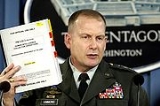
FM 2-22.3 Human Intelligence Collector Operations
Encyclopedia

Human intelligence
Human Intelligence may refer to:* Human intelligence in the species as the property of mind that encompasses many related abilities, such as the capacities to reason, plan, problem solve, think, comprehend ideas, use languages, and learn....
operations, the debriefing
Debriefing
-Military debriefing:Debriefings originated in the military. This type of debriefing is used to receive information from a pilot or soldier after a mission, and to instruct the individual as to what information can be released to the public and what information is restricted...
of soldiers, and the analysis of known relationships and map data. The largest and most newsworthy section of the document details procedures for the screening and interrogation of prisoners of war and unlawful combatants.
Political issues
Drafting of the manual reflected concerns about enhanced interrogation techniquesEnhanced interrogation techniques
Enhanced interrogation techniques or alternative set of procedures are terms adopted by the George W. Bush administration in the United States to describe certain severe interrogation methods, often described as torture...
and/or torture
Torture
Torture is the act of inflicting severe pain as a means of punishment, revenge, forcing information or a confession, or simply as an act of cruelty. Throughout history, torture has often been used as a method of political re-education, interrogation, punishment, and coercion...
, such as water boarding, that followed after a 2003 memo by John Yoo
John Yoo
John Choon Yoo is an American attorney, law professor, and author. As a former official in the United States Department of Justice during the George W...
determined that the wartime authority of the U.S. president overrode international agreements against torture. Revision of the manual from the previous FM 34-52 Intelligence Interrogation
FM 34-52 Intelligence Interrogation
The US Army Field Manual on Interrogation, sometimes known by the military nomenclature FM 34-52, is a 177-page manual describing to military interrogators how to conduct effective interrogations while conforming with US and international law...
followed passage of a law in 2005, pressed by Senator John McCain
John McCain
John Sidney McCain III is the senior United States Senator from Arizona. He was the Republican nominee for president in the 2008 United States election....
, that caused interrogation techniques not included in the manual to be considered illegal for the U.S. Army, but not for the CIA. Therefore, the release of the manual was seen to prohibit Army personnel from methods such as mock execution
Mock execution
A mock execution is a stratagem in which a victim is deliberately but falsely made to feel that his execution or that of another person is imminent or is taking place. It may be staged for an audience or a subject who is made to believe that he is being led to his own execution...
s, sexual humiliation, hooding
Hooding
Hooding is the placing of a hood over the entire head of a prisoner. One legal scholar considers the hooding of prisoners to be a violation of international law, specifically the Third and Fourth Geneva Conventions, which demand that persons in the power of occupying forces be treated humanely....
prisoners and "waterboarding
Waterboarding
Waterboarding is a form of torture in which water is poured over the face of an immobilized captive, thus causing the individual to experience the sensation of drowning...
". On March 8, 2008 president George W. Bush
George W. Bush
George Walker Bush is an American politician who served as the 43rd President of the United States, from 2001 to 2009. Before that, he was the 46th Governor of Texas, having served from 1995 to 2000....
vetoed a bill, supported by Democrats and opposed by John McCain, which would have restricted the CIA to the techniques in the manual.
Disputes during the manual's preparation included whether a section on interrogation techniques would remain classified, and whether the Geneva conventions
Geneva Conventions
The Geneva Conventions comprise four treaties, and three additional protocols, that establish the standards of international law for the humanitarian treatment of the victims of war...
ban on "humiliating and degrading treatment" would be removed.

